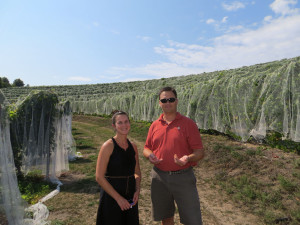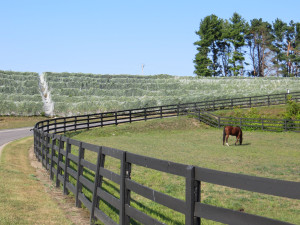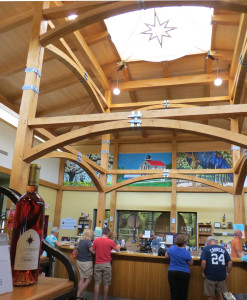Black Star Farms Boldly Goes Where No Pinot Has Gone Before
Wine: the final frontier. These are the voyages of the Michigan wine industry. To explore strange new worlds for grapes, to seek out new terrain for viticulture and boldly go where no grape grower has gone before.
The Michigan wine industry has progressed light years since the ’70s when 90% of Michigan’s production was sweet labrusca wines. And it was less than 40 years ago when the Buzz Aldrin of Traverse City, Edward O’Keefe of Chateau Grand Traverse, planted the first vinifera grapes in Northern Michigan.
Now Black Star Farms Winery in Leelanau County has made Pinot Noir, the wine drinker’s wine, its signature grape. Given the high expectations of Pinot Noir drinkers – like the main character in the 2004 movie Sideways – it’s noteworthy that a winery in an emerging wine region would dedicate itself to a grape that Jancis Robinson calls ‘capricious and extremely variable.”
Lee Lutes at Black Star is aware of the risks and rewards of committing to Pinot Noir. “Pinot Noir is also known as the heartbreak grape – the bastard grape, or any number of other negative associations. This is one variety, however, that greatly reflects it’s growing season and viticulture, so you need to work closely with it in order to really capture the best qualities of the variety.”
Black Star Farms also makes estate grown Pinot Gris and Pinot Blanc. But the black version of the Pinot clone is the largest seller with over 3,000 cases produced in 2011. “No one else in the state is as dedicated to the variety,” Lutes said.
As unlikely as it may seem, the Old Mission and Leelanau County areas of Northern Michigan are well suited to growing many types of Pinot grapes, including Pinot Noir. As Lutes explains, “We are now farming five different Pinot Noir sites within our growing [owners’] group, and each of them is unique; there is so much soil variation up here.”
The vineyard at Black Star’s main location in lower Leelanau County (see map below) is very dense, heavy soil, with a great deal of clay and rock in it. According to Lutes, wines from this vineyard tend to be earthier with dark fruit and minerality. The two Old Mission sites – A Capella and Montana Rusa – are sandy loam sites over layers of clay and gravel and produce more fruit forward wines.
The Leelanau Summit site and the Isidor’s Choice are sandier sites, which create very bright fruit profiled wines, but require more crop restriction in order to have wines of distinction.

Coryn Briggs, Director of Marketing, and Lee Lutes of Blackstar Farms. Extensive bird netting is a necessity at Black Star where grapes often ripen into October.
While some local grape growers favor rootstock from cold climate nurseries, Blackstar’s Pinot vines came from nurseries in California. Lutes said Blackstar prefers Pinot clones that are generally known as the Dijon clones.
“The Dijon clones are known to be best for ripening in cooler climates. The variety is highly susceptible to mutations, so there are numerous clones out there. It’s been said that by the time a vineyard is 30 years old, one Pinot clone may have mutated to more than 50! Supposedly, there might be more than 1,000 Pinot clones in Burgundy. The vine has some very early history and is thought to be one of the original vines cultivated from wild vines – this may also help explain its tendency to mutate. Burgundy is generally thought of as its motherland, however”
The traditional Burgundian “motherland” style is often used to describe Northern Michigan Pinot Noir. This means more emphasis on mineral and earth notes than California Pinot, which tends to taste more like fruit and has higher alcohol levels.
Charlevoix Michigan based master sommelier Ron Edwards closely follows how Michigan is positioned in the global wine marketplace. He says Michigan Pinot Noir has been on a quality upswing for the last decade and has now reached a point where it can compete with wines more commonly purchased in this category.
Edwards added that Pinot Noir is a very competitive category with wines from all over the globe covering all price ranges. “The most commonly consumed Pinot Noir wines in the Midwest are from California first and Oregon second,” Edwards said. “Our Michigan wines are far more like the original benchmark for Pinot Noir, Burgundy. The downside of this is that Burgundy has fallen out of favor with most wine drinkers due to price and style.”
Edwards believes that Michigan has both an obstacle and an opportunity with Pinot Noir. The obstacle is competing with juicier warm climate, wines which are the current preference and are being sold at highly competitive prices. According to Edwards, wine buyers need to be introduced to the expected style of cool climate Pinot Noir before a winery should expect them to appreciate it.
“Michigan’s opportunity with Pinot Noir is to reintroduce the delicacy of Pinot Noir to those who once drank Burgundy but the prices drove them out of the market. Consistency will be the only hope for success with this grape; Michigan has to find a groove that is predictable and attainable to keep any market share in the vicious world of Pinot Noir,” Edwards said.
To address the challenge of being a relative newcomer, Black Star has segmented its Pinot Noir offering by price and vintage. There have been five different labels of Pinot Noir at Black Star. A weaker harvest in 2009 was “declassified” into a Black Star Farms label that was less expensive and simpler in its profile. On the other end of the spectrum, an “A Capella” bottling from 2007 – Black Star’s premier label for the best vintages – was aged in new French oak barrels.
Lutes said the Arcturos label is Black Star’s “front line” bottling and the largest lot. This wine sells retail for around $22. Arcturos Pinot is also aged in French oak, but in older barrels with less new oak “punch.”
Lutes said this wine has a good fruit profile with more significance on the palette. “Our Arcturos wine is more approachable earlier and still ages well for 5-10 years.” Recently, Black Star’s Arcturos Pinot Noir won a Double Gold Medal at the Finger Lakes Wine Competition, the second largest wine contest in the U.S.
The winery also has released an Isidor’s Choice label which is a single vineyard bottling from a prime site in the middle of Leelanau County. Lutes said Isidor’s Choice is balanced with subtle oak, but more fruit forward. Lutes said that wine made from grapes grown on this site have a unique “bright” characteristic. Black Star also has a Blanc de Noir sparkling wine from 100% Pinot.
Pinot Noir tends to bud early and ripen late which can be a challenge. Lutes said Black Star’s proximity to Lake Michigan produces cool springs and prevents early bud break. Getting Pinot to ripen in Northern Michigan is usually not a problem according to Lutes. “Pinot actually ripens early for us compared to Cab Franc or Merlot. We are usually bringing it in the during the first two weeks of October, if not earlier, which was the case of 2012 with all the heat and sun we had last summer!”
Lutes said that Black Star averages 13 clusters per vine for Pinot Noir but the clusters tend to be smaller than other cultivars. While other reds like Cab Franc can yield 3.0-3.5 tons per acre, Pinot Noir normally only yields around two tons per acres. Lutes said that he routinely reduces the crop load for Pinot Noir to maintain fruit quality.
The ripe Michigan fruit adds a hint of sweetness to the ’11 Arcturos Pinot although the wine is fermented bone dry. Lutes believes that this perception of sweetness is part of its allure. “Our Pinot Noir can be fairly high in pH, which can make it taste broad in its texture and add to the perception of sweetness. It usually spends extended time on the sweet lees following fermentation, and this can greatly add to an extended mid-palette, which also enhances that perception. Barrel aging also can add a little perceived sweetness to the palette.”
Black Star Pinot – like most Leelanau County wine – is largely hand made. The grapes are hand harvested because Lutes said that Pinot is too fragile and will degrade too quickly if picked otherwise. During fermentation, the caps on the tanked wine are also hand punched.
Kelly Kniewel of Fresh Coast Distributors in Chicago, which distributes Black Star Farms in Illinois, said, “Some of the Oregon Pinots knock you over the head, but the Michigan Pinots have more finesse. When wine drinkers taste Black Star Pinot Noir they are always pleasantly surprised.”
[wp_geo_map]





